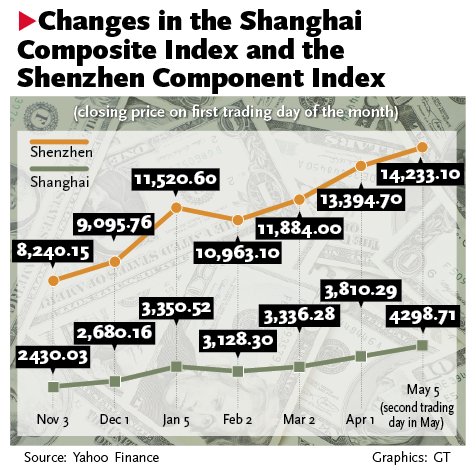

 |
| (Graphics: GT) |
Mainland stock markets declined amid a heavy sell-off of shares Tuesday, with investors concerned about the excessive valuation of stocks and tighter margin trading rules.
After rising for three consecutive days, the Shanghai Composite Index declined 4.06 percent or 181.76 points to close at 4,298.71 points Tuesday, the sharpest fall since January 19. The Shenzhen Component Index slumped by 4.22 percent or 627.43 points to 14,233.10 points.
The CSI 300 Index of the biggest companies traded in Shanghai and Shenzhen fell by 3.99 percent or 190.90 points to 4,596.84 points.
Turnover on the two bourses remained high at 1.36 trillion yuan ($219.29 billion), up from the previous trading day's 1.24 trillion yuan.
In a research note sent to the Global Times on Tuesday, Shanghai-based SWS Research & Consulting Co described the plunge as a "black Tuesday," attributing the drop to a new round of IPOs that started on the same day.
A total of nine companies began taking subscriptions on Tuesday for their IPOs, and 14 more companies are scheduled to launch subscriptions on Wednesday and Thursday, adding to liquidity pressure in the market.
Another factor weighing on investor sentiment is faster approvals of IPOs by the China Securities Regulatory Commission (CSRC), which has now reached two approvals each month, up from one, Li Daxiao, chief economist at Shenzhen-based Yingda Securities, told the Global Times Tuesday.
However, the two main factors behind Tuesday's sell-off are the excessive valuation of shares and tighter regulations on margin financing, said Gui Haoming, director of the wealth management research department at Shenwan Hongyuan Group Co.
"The current valuation of stocks is too high. The average dividend yield ratio of A shares is just 0.51 percent, which means shareholders would need nearly two centuries to get their investment back with these shares," Li told the Global Times Tuesday.
The State-run Shanghai Securities News reported Tuesday that some brokerages including CITIC Securities Co and Haitong Securities Co now have tighter requirements for margin trading. Margin trading, in which investors borrow money to buy stocks, has repeatedly broken records in recent trading sessions.
Gui said investors' concerns were heightened after the CSRC launched an investigation on Monday into a possible violation of regulations by Shanghai DZH Ltd, a supplier of Internet financial information services.
Investors took it as a signal of more such measures to come from the watchdog, according to Li.
Investors have received repeated warnings about possible overheating of the stock market recently. State media, including People's Daily, warned of risks in the current bull market on Monday, following a similar warning from Xinhua News Agency on Sunday.
On Tuesday, the decline was led by stocks linked to construction, transportation, steel and coal companies, which fell by 5 percent on average.
Before the sell-off on Tuesday, companies listed in Shanghai and Shenzhen had reached a total capitalization equivalent to 10.8 percent of the global market, according to Bloomberg data on Tuesday. The capitalization reached 10 percent of the global total in US dollar terms on April 7, according to Bloomberg.
The Shanghai-Hong Kong Stock Connect scheme has helped boost the Hong Kong Stock Exchange, with the capitalization of its companies reaching 7.4 percent of the global total on Monday, overtaking Japan on 7 percent, Bloomberg said. The leader was still US stock markets, with capitalization accounting for 34.8 percent of the global total.
The benchmark Shanghai Composite Index and the Shenzhen Component Index have risen by almost 33 percent and 30 percent, respectively, since the start of this year.
The strong rally was triggered partly by an unexpected interest rate cut for the first time in two years in November 2014.
The People's Bank of China, the central bank, announced the cut on November 21 in a bid to prevent an excessive slowdown in the country's economic growth.
 J-11 fighters in air exercise
J-11 fighters in air exercise Beauties dancing on the rings
Beauties dancing on the rings Attendants-to-be join Mr. & Miss Campus Contest
Attendants-to-be join Mr. & Miss Campus Contest Beijing's toughest anti-smoking law takes effect
Beijing's toughest anti-smoking law takes effect Family lives in cave for about 50 years in SW China
Family lives in cave for about 50 years in SW China PLA soldiers operating vehicle-mounted guns in drill
PLA soldiers operating vehicle-mounted guns in drill Blind carpenter in E China's Jiangxi
Blind carpenter in E China's Jiangxi China hosts overseas disaster relief exercise for the first time
China hosts overseas disaster relief exercise for the first time 20 pairs of twins who will become flight attendants in Sichuan
20 pairs of twins who will become flight attendants in Sichuan Obama is sowing discontent in S.China Sea
Obama is sowing discontent in S.China Sea Rescuers work through night to reach cruise ship survivors
Rescuers work through night to reach cruise ship survivors Driving through limbo
Driving through limbo Facing down MERS
Facing down MERSDay|Week